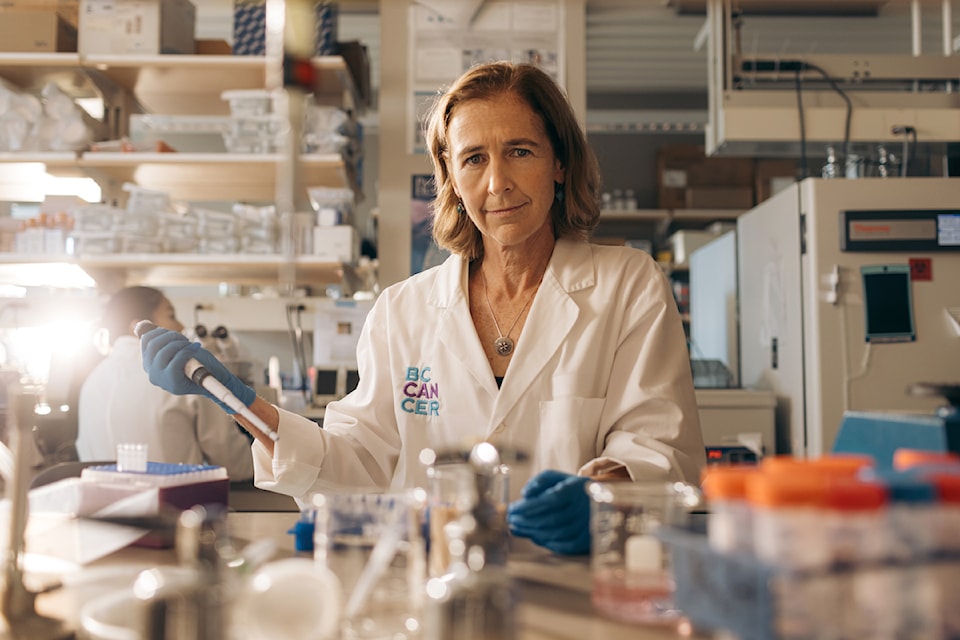Science
AI Innovation Set to Revolutionize Women’s Cancer Care in Victoria

An innovative application of artificial intelligence (AI) is on the horizon for women’s cancer treatment in Victoria, British Columbia. Researchers from BC Cancer and the University of British Columbia (UBC), led by Dr. Jessica McAlpine and Dr. Ali Bashashati, are pioneering a system aimed at improving the diagnosis and treatment of endometrial cancer, which ranks as the sixth most common cancer among women globally.
Endometrial cancer presents unique challenges due to the ambiguous nature of its cell structures. This ambiguity can lead to inconsistent diagnoses, complicating treatment decisions for patients. To address this issue, the research team has developed a system that categorizes endometrial cancer into four distinct groups, each associated with different clinical outcomes. Despite this progress, a particular group remained difficult to classify, prompting the introduction of the AI ProMisE test.
“We were able to look at these images of tumors and identify things that the pathologist couldn’t see and that the molecular tools couldn’t identify,” stated Dr. McAlpine. The AI technology enables medical professionals to discern which patients, despite appearing to have favorable prognoses, may actually be at risk for poorer outcomes. This capability allows for more targeted treatment approaches, potentially preventing cancer recurrences.
The AI tools, which consist of advanced scanners and hardware, could be deployed in healthcare facilities in Victoria as early as 2024, contingent on securing philanthropic funding and necessary approvals. “We plan to pilot it in a couple of centres, and Victoria is potentially one of those,” Dr. McAlpine added, highlighting the collaboration with local researchers and oncologists.
The potential implementation of this technology resonates deeply with Dr. Brad Nelson, who recently assumed the role of Immunotherapy Research Chair with BC Cancer in Victoria. In a previous interview, he emphasized the critical need for research focused on women’s cancers, which have often been undervalued and underfunded in the medical community. This sentiment is further underscored by the legacy of Joyce Deeley, who succumbed to ovarian cancer in 2001. The Trev & Joyce Deeley Research Centre in Victoria, named in her honor, serves as a reminder of the importance of advancing cancer research.
“Gynecological cancers are some of the most difficult cancers to treat and historically are an understudied area of cancer research,” said William Litchfield, associate vice president of the BC Cancer Foundation for Vancouver Island. “The innovative research underway at BC Cancer is incredibly important and holds the potential to save lives on the Island and across B.C.”
This announcement coincides with Gynecological Cancer Awareness Month in September, underscoring the urgency of addressing these significant health challenges. The AI technology is particularly promising in identifying high-risk endometrial cancers that traditional methods often overlook. Dr. McAlpine noted that this application represents just the beginning of AI’s potential impact. “There are so many other applications we’re also looking at,” she explained. “AI tools offer a more personalized or precision approach. You’re not treating everybody the same.”
As the research progresses, the integration of AI into cancer care could not only enhance diagnostic accuracy but also significantly improve patient outcomes. With further funding and support, the initiative in Victoria could serve as a model for transforming women’s cancer treatment across Canada and beyond.
-

 Education3 months ago
Education3 months agoBrandon University’s Failed $5 Million Project Sparks Oversight Review
-

 Science4 months ago
Science4 months agoMicrosoft Confirms U.S. Law Overrules Canadian Data Sovereignty
-

 Lifestyle3 months ago
Lifestyle3 months agoWinnipeg Celebrates Culinary Creativity During Le Burger Week 2025
-

 Health4 months ago
Health4 months agoMontreal’s Groupe Marcelle Leads Canadian Cosmetic Industry Growth
-

 Science4 months ago
Science4 months agoTech Innovator Amandipp Singh Transforms Hiring for Disabled
-

 Technology4 months ago
Technology4 months agoDragon Ball: Sparking! Zero Launching on Switch and Switch 2 This November
-

 Education4 months ago
Education4 months agoRed River College Launches New Programs to Address Industry Needs
-

 Technology4 months ago
Technology4 months agoGoogle Pixel 10 Pro Fold Specs Unveiled Ahead of Launch
-

 Business3 months ago
Business3 months agoRocket Lab Reports Strong Q2 2025 Revenue Growth and Future Plans
-

 Technology2 months ago
Technology2 months agoDiscord Faces Serious Security Breach Affecting Millions
-

 Education4 months ago
Education4 months agoAlberta Teachers’ Strike: Potential Impacts on Students and Families
-

 Education3 months ago
Education3 months agoNew SĆIȺNEW̱ SṮEȽIṮḴEȽ Elementary Opens in Langford for 2025/2026 Year
-

 Science4 months ago
Science4 months agoChina’s Wukong Spacesuit Sets New Standard for AI in Space
-

 Business4 months ago
Business4 months agoBNA Brewing to Open New Bowling Alley in Downtown Penticton
-

 Business4 months ago
Business4 months agoNew Estimates Reveal ChatGPT-5 Energy Use Could Soar
-

 Technology4 months ago
Technology4 months agoWorld of Warcraft Players Buzz Over 19-Quest Bee Challenge
-

 Business4 months ago
Business4 months agoDawson City Residents Rally Around Buy Canadian Movement
-

 Technology2 months ago
Technology2 months agoHuawei MatePad 12X Redefines Tablet Experience for Professionals
-

 Technology4 months ago
Technology4 months agoFuture Entertainment Launches DDoD with Gameplay Trailer Showcase
-

 Top Stories3 months ago
Top Stories3 months agoBlue Jays Shift José Berríos to Bullpen Ahead of Playoffs
-

 Technology4 months ago
Technology4 months agoGlobal Launch of Ragnarok M: Classic Set for September 3, 2025
-

 Technology4 months ago
Technology4 months agoInnovative 140W GaN Travel Adapter Combines Power and Convenience
-

 Science4 months ago
Science4 months agoXi Labs Innovates with New AI Operating System Set for 2025 Launch
-

 Technology4 months ago
Technology4 months agoNew IDR01 Smart Ring Offers Advanced Sports Tracking for $169










